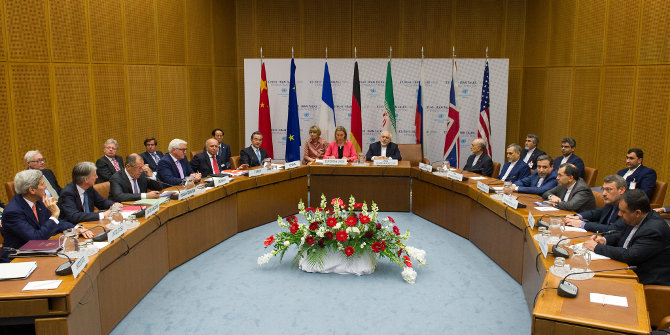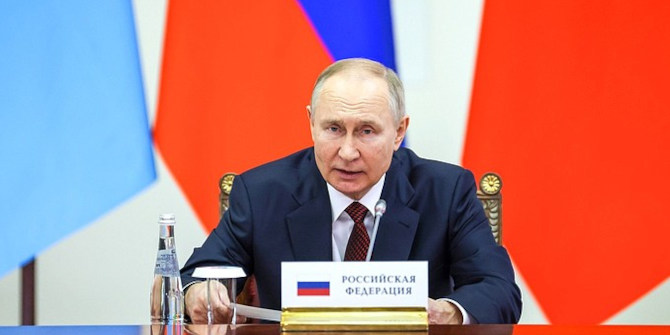 Last week, the five permanent members of the United Nations Security Council, plus Germany, came to an agreement with Iran over the country’s nuclear programme in exchange for the phasing out of sanctions. Harry C. Blaney III writes that the deal shows what intense diplomacy can accomplish, even in the face of cries for war, and that it may also be the beginning of a framework to reduce nuclear proliferation in other countries such as India, Pakistan and North Korea.
Last week, the five permanent members of the United Nations Security Council, plus Germany, came to an agreement with Iran over the country’s nuclear programme in exchange for the phasing out of sanctions. Harry C. Blaney III writes that the deal shows what intense diplomacy can accomplish, even in the face of cries for war, and that it may also be the beginning of a framework to reduce nuclear proliferation in other countries such as India, Pakistan and North Korea.
The deal agreed with Iran on 14 July is a good one for both Iran and for the rest of the world, including America and yes Israel. It is, in short, a “win-win” for all despite some compromises by both sides. It does exactly what President Obama said he wanted, namely, closing off all likely paths for Iran to obtain nuclear weapons over the next ten years and likely, from my perspective, even beyond.
The deal addresses the key issues of these very difficult negotiations: inspections and verification; the phasing out of sanctions and how they might be brought back in case of violations; and the institutionalizing of the verification requirements of the “Additional Protocol” of the Non-Proliferation Treaty (NPT). The “Additional Protocol” is unlimited and makes a “breakout” highly unlikely without the West knowing exactly what is taking place. The deal restricts research and development on more advanced centrifuges. It keeps in place and adds major limits on the amount of low enriched uranium while significantly reducing the number and function of existing or future centrifuges during the agreement’s specified time period.
In short, as President Obama said “This deal meets every single one of the bottom lines that we established when we achieved a framework this spring,” furthermore he said, “Every pathway to a nuclear weapon is cut off, and the inspection and transparency regime necessary to verify that objective will be put in place.”
What we need now to focus on first is the implementation of the accord and not let it unravel either in Tehran or in Washington. Above all we need to not let the caustic and irresponsible statements of Israeli Prime Minister Benjamin Netanyahu that the accord was an historical mistake and that Iran would still get a nuclear weapon out of the agreement deter us.
The sad part of all this is that the main beneficiary of this accord is Israel, as without the agreement there would be no limitations on Iran building an atomic bomb. The other alternative is seen by most to be ultimately war. Now there is time and perhaps the willingness to work towards a long-term security structure for the entire Middle East. Israel is far more secure now unless it acts foolishly. This agreement has reduced the chances of a likely un-winnable war which would have catastrophic results for the entire region not least Israel.
I see the impact of this accord at a number of levels. For example, a possible rapprochement and security framework for the Middle East, implications for non-proliferation efforts and the NPT, and recognition of the role of and need for new intense diplomacy and what it can accomplish in determined hand, rather than cries for war. American leadership in wise hands can accomplish a lot. We may have an opening to widen political and economic possibilities should both sides decide that engagement, compromise, stability and true security is in the common interest. I argued at the start of these negotiations that an agreement was likely in the end because on any “net assessment” both sides could gain.
Implications for the Middle East
Looking beyond this agreement, we have repeatedly written long ago that a possible agreement might lead to other diplomatic actions by both sides. While it remains uncertain if new cooperation might be possible, this agreement could, with hard work, have profound impact on the Middle East hopes for reconciliation and security.
Out of this now established dialogue with much difficulty, a larger set of solutions to the many conflicts and bitter rivalries between the Sunni and the Shia, and also more security for Israel. We need to have the Arab states themselves see a better way forward. Both sides now need to grasp at the momentum of the July 14th deal and start looking at fundamental issues that can be resolved for again a “win-win” solution. Courage on all sides will be required.
 Credit: European External Action Service (Flickr, CC-BY-NC-2.0)
Credit: European External Action Service (Flickr, CC-BY-NC-2.0)
Nuclear and NPT implications and opportunities and security in the region
It is clear the move towards a world with less nuclear weapons and the possible use of them has likely gained by this agreement if implemented. But for this to happen there is a need for a deeper and wider look at other “nuclear actors” and to try to create a structure where non-proliferation and nuclear weapons are seen more as a mortal danger rather than an instrument of security and national safety. That means frankly we need to look hard again at India, Pakistan, North Korea, China, Israel and at those that might be potential proliferators in the future. America and Russia need to look for further reductions in their nuclear weapons. Here the lesson is that the instruments of diplomacy need to be fully engaged in new and creative ways. If America with the other powers and Iran can sit down together and hammer out this agreement then other nuclear regimes and nexus of conflict can and should also be addressed in new and stronger ways.
Larger political and economic and diplomatic dimensions
From this agreement new possibilities for cooperation can arise for areas like economic growth, trade, addressing poverty and unemployment, and new views on building mutual security. There is need to get at the more fundamental causes of conflict, hate, prejudices, and long standing conditions that breed terrorism and mass violence.
America saw this after World War II with the Marshall Plan. This initiative moved away from retribution and punishment to rebuilding societies including former enemies, helping nurture cooperation and institutions like the UN, the World Bank, NATO, the EU and so many other organizations to cement cooperation and sharing of burdens and risks.
Some in America, especially among the far right today in the Republican Party, have long nurtured a move towards military adventurism, a hate of multilateral diplomacy especially by a democratic President, and thought war was the main or only effective instrument of global engagement. That has proved to be a disaster for all. Already Republican leaders have stated their blind opposition without even reading the text, their motivation being not the national interest but their distaste for our president.
President Obama and Secretary Kerry have proven these naysayers and critics wrong. Time and time again strong diplomacy gained as with the New SALT agreement, lowering our military footprint in Iraq and Afghanistan, reaching out to countries like India, Burma, Cuba and our pivot to Asia, and in many other ways. We should strengthen our efforts to deal with incipient conflicts in many areas, with what I call “preventive diplomacy” as a less costly alternative to military action.
We need to strengthen the use of our many diplomacy tools, and yes, that does mean sanctions when necessary, and also the application of “carrots” and “sticks” when needed. It includes wise development assistance and listening to others.
Efforts by this administration at mediation, engagement, and dialogue show to the American people that under Obama America is still, as he said, a kind of “indispensable nation” but also with others, in creating a more peaceful world. By addressing arising conflicts rather than ignoring our problems we have made some progress in a difficult environment. This approach is better than putting, as some Republicans seem to want, either putting our heads in the sand in isolationism or seeing mindlessly putting “troops on the ground” as the simplistic answer to every problem.
We need to recognize the necessity of strengthening, reforming, providing more resources and in general making more effective international institutions. The IAEA has played a vital role in the Iran nuclear agreement and its inspection and verification role. But also International Organizations like UNHCR, UNRRA, The World Bank, NATO, World Food program, and the United Nations as a whole and the Security Council, which voted sanctions which led to this agreement. We also need new strong instruments of multilateral diplomacy, of effective peacekeeping and peacemaking. All of these instruments of “diplomacy” can in time bring our now dangerous and conflict ridden world a bit of peace and security that all can share.
Please read our comments policy before commenting.
Note: This article originally appeared at our sister site, USAPP – American Politics and Policy and the Rethinking National Security blog. It gives the views of the author, not the position of EUROPP – European Politics and Policy, nor of the London School of Economics.
Shortened URL for this post: http://bit.ly/1MLRQSx
_________________________________
 Harry Blaney – Center for International Policy
Harry Blaney – Center for International Policy
Harry Blaney is a Senior Fellow at the Center for International Policy. He brings over thirty years of experience in international affairs to CIP and has held senior positions in the federal government, policy research, and non-profit organizations. His experience includes the White House, State Department, foreign affairs think tanks, and U.S. diplomatic posts abroad. His main focus has been on national security, including non-proliferation arms control, US-Europe relations, US-Russia, and global issues including energy, climate change, conflict zones, NATO, EU, and macro-strategic issues.





